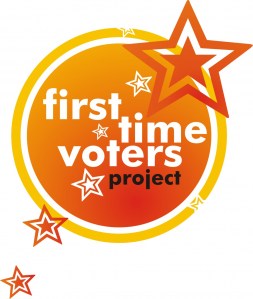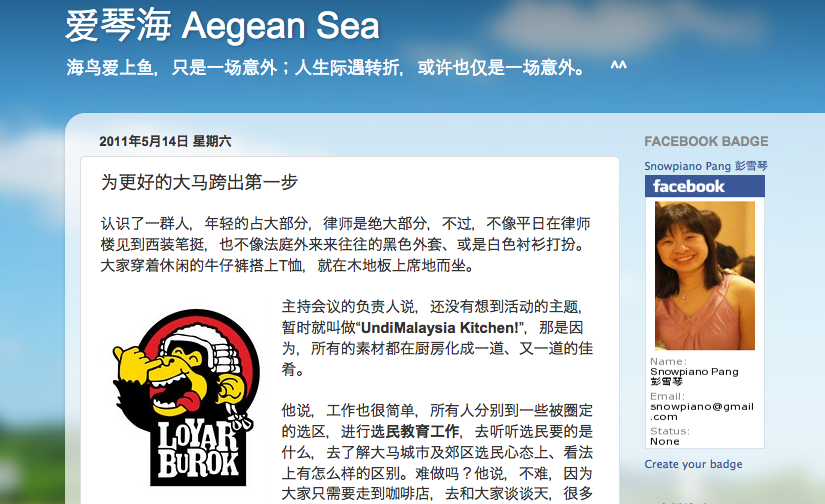Spot where Snowpiano is in this secondary school photo
Pang Sheue Chyn, fondly known by many people as “Snowpiano” shares her view on volunteerism in an exclusive interview.
Snowpiano / sno-pee-a-no/
Noun: 29-year old female journalist. Studied Science and Technology Management at University Malaya. Worked as an Assistant Editor for Rocket newsletter for 1 year before becoming a journalist with Oriental Daily News for 2 1/2 years.
Verb: Dreams of a world without discrimination, injustice and abuse of power. Dreams of a world with happiness and joy amongst all races in Malaysia. Dreams of a better Malaysia.
Adjective: Reading and writing news on politics ignites the fire in her.
Ka Ea: What got you interested in doing volunteering work?
Snowpiano: I was first exposed to volunteering work after a group of students from the Universiti Teknologi Malaysia (UTM) came to my school in Kulai during the reformasi period. I was in Form Five then.
The UTM students organised an exhibition on various issues that touched on corruption, independence of our judiciary, rising price of petrol, impact of foreign policies on Malaysia, etc. The students stressed that these were important issues that students need to know about and to be honest, many of us were not aware of it.
Some of us were so troubled by these revelations that we wanted to create similar awareness on other youths.
At the World Peace exhibition in Kulai
Ka Ea: So what did you do to create that awareness?
Snowpiano: I got together with a team of 20 to 30 friends from school to organise a similar exhibition but focussing more on world peace at a shopping centre in Kulai. It was really fun and we learned a lot about how to organise exhibition and various issues such as education, international and national politics.
Ka Ea: D0 you think what you did have an impact at all?
Snowpiano: I’m not sure whether it was a success and whether we achieved what we set out to do since we were too young to assess such things. (Laughs)
Standing, second from the left.
Ka Ea: I’m really amazed and curious. You were really young. Did your school and parents know about this? Were they not worried about your engagement in “political activity” at such a young age?
Snowpiano: We did this on our own initiative. It didn’t involve our school. So, I don’t know what they think about it.
As for my parents, they trusted us and they didn’t object to it and to be honest, they thought it was a school project inspired by a group of university students. So what harm could it do? It was part of learning.
Many of my friends who participated in this activity went on to become politicians, government officials, teachers, NGO workers and journalists. So, I think we turned out not too bad! (Laughs)
Ka Ea: What drives you? Do you choose the type of cause you volunteer for?
Snowpiano: Any issues that affect Malaysians and Malaysia in general, interest me. So, I don’t really pick and choose a cause.
Once, my friends and I organised a camping retreat for drop-out students living in remote villages. Our objective was to create awareness on the importance of education. Education, not just from a classroom perspective. We wanted to impart on these students that even if they were not interested in their studies, they must find other meaningful ways of living their lives. You see, we were saddened by how many of them resorted to gangsterism after they dropped out from schools. We had workshop and counselling sessions with the students and hoped that these would help them to gain some perspectives in life.
I’m still in touch with some of them and am very happy to know that many of them have gone on to become responsible citizens. These are some of the things which drive me to do volunteering work.
Ka Ea: That’s amazing work. How did you mobilise all these youths? And did it cost you a lot to organise these activities?
Snowpiano: We spoke to [the] village heads and some school teachers and asked them for their help to identify the youths.
We also did fundraising on the streets. To be honest, it didn’t cost much. All of us also contributed some [money] from our own pockets. Seriously, people often think it costs a lot to organise activities but if you’re resourceful enough and keep the cost down to what’s necessary, it really doesn’t cost much.
Ka Ea: So, what happened to the “project”? Was there any continuity?
Snowpiano: It’s unfortunate. We wanted to do more but all my friends left Kulai after we graduated from secondary school. It was difficult to get together and continue [the project].
I’ve learned from this that it is important to build a DIY community, such as the one UndiMsia! is trying to achieve. Those who start a project must make sure that they pass on the knowledge and skills to others.
Sustaining a project is a challenge. It’s a waste to stop a good activity from continuing. [We] need to always nurture new people to take over.
Ka Ea: So, how would you encourage youths to do volunteering work? Many seem to think that they must concentrate on their studies and career first before they have the time to do anything else.
Snowpiano: I believe many people do not see the values of volunteerism. In fact, volunteerism can help youths to learn about many things which are useful to their studies and work. For instance, it really helps you to plan, organise and manage your time and work. These are things you can’t learn from a classroom. It helps you to realise your goal and purpose in life. It helps you to be resourceful and find ways of achieving things.
Finally and I think most importantly, it makes you alive. I notice that volunteers tend to be individuals who have passion for life. They have this spirit in them and I think this is wonderful.
Ka Ea: Yes, yes, it all sounds good but why do you think it’s so hard for many organisations to recruit and mobilise volunteers?
Snowpiano: (Ponders for awhile) Honestly? I think we must do away with traditional methods of recruiting volunteers. NGOs must be more result-orientated like the corporate world. The NGO mentality of skimping on money and time can sometimes be counter-productive. Sometimes, it’s important to spend more money and time to invest on fun and innovative activities that will attract volunteers.
I think sometimes, NGOs need to be a bit more “aggressive” and open-minded in their method of engagement. As long as the purpose is good, the method should not a factor. If [they] need to spend money to achieve results, then I think it’s justified.
Ka Ea: So, do you agree that volunteers should be paid?
Snowpiano: If an organisation can afford it, I don’t see why not. At least an allowance to help them cover some cost. But if someone expects to be paid when you ask for their help, then it’s not called volunteering, is it?
Ka Ea: Any last words?
Snowpiano: Errr…. yes. Let’s face it. Most youths are not interested to do volunteering work. I think there’s no point preaching to them about the benefits [of volunteering]. It’s pointless telling them [that] because they all know there is a shortage of volunteers to help out with so many issues in the world.
I think we need to stop talking so much and just get them to volunteer. Once they see the results of their work, it will encourage them to do more. Once they see how their work are affecting others and that they’re part of something, they will automatically volunteer. They must first see the results for themselves.
Ka Ea: So, basically, you’re saying we should all shut up and just do it?
Snowpiano: (Nods her head enthusiastically) Precisely.
On the stage with her friends at a mall in Kulai

















